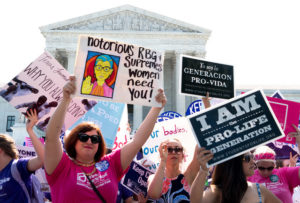
Georgia passes restrictive abortion law, FTC asks Congress to pass privacy legislation, and more…
IN THE NEWS
- Georgia enacted a so-called heartbeat law that effectively bans abortion after six weeks of pregnancy, described by the The New York Times as “one of the most restrictive abortion laws in the nation.” The state joins several others that have passed similar laws, which the Editorial Board of The Washington Post argued have been spurred by Justice Brett Kavanaugh’s appointment to the U.S. Supreme Court. Former Democratic presidential nominee Hillary Clinton called the Georgia law and those like it “illegal measures that threaten women’s lives and freedoms.”
- The Federal Trade Commission asked Congress “to enact privacy and data security legislation” which would grant the Commission greater authority to regulate tech companies. Representative Jan Schakowsky (D-Ill.) stated that Democrats on the House Committee on Energy and Commerce had an obligation to produce this bill and expressed her “hope that this legislation will be bipartisan.” Representative Greg Walden (R-Ore.) reportedly commented that Republicans are “ready and willing to tackle crafting such a bill.”
- The United Kingdom (UK) and Ireland agreed to preserve the rights of British and Irish citizens to travel, work, and reside in both countries should the UK withdraw from the European Union (EU). The agreement also maintained voting rights, financial support for students, and social security benefits for British citizens living in Ireland and Irish citizens living in the UK.
- The City of Los Angeles filed suits against electronic tax preparation companies Intuit, maker of TurboTax, and H&R Block for allegedly deceptively and misleadingly “undermining public access to Internal Revenue Service’s ‘Free File’ program.” City Attorney Mike Feuer stated that the companies “intentionally took advantage of the low-income residents they pledged to help.” The lawsuits followed a report by ProPublica claiming that the companies deliberately aimed to steer customers away from the free software they developed in agreement with the Internal Revenue Service.
- In a 50–43 vote, the U.S. Senate confirmed Janet Dhillon as chair of the U.S. Equal Employment Opportunity Commission (EEOC), giving the EEOC a quorum for the first time since January. Dhillon most recently served as General Counsel of Burlington Stores. Independent Women’s Forum President Carrie Lukas called Dhillon a “solid, commonsense conservative,” while the NAACP had opposed Dhillon’s nomination, stating that her interests “lie in protecting the interests of businesses, not in protecting or advancing workers’ rights.”
- In response to a recent U.S. Environmental Protection Agency (EPA) rule that might allow the re-introduction of asbestos in some products, Democrats on the House Committee on Energy and Commerce prepared a bill that would ban asbestos entirely. Committee Chairman Frank Pallone (D-N.J.) claimed that EPA “is not using the tools we gave it to regulate dangerous chemicals” and stated that the agency’s behavior in writing the rule was “legally suspect.” Representative John Shimkus (R-Ill.) reportedly criticized the bill, saying that the Democrats were politicizing the issue and that they “would be very skeptical” if the parties were reversed.
- Voters in Denver passed a ballot initiative to make psilocybin mushrooms the “lowest law-enforcement priority” in the city, so long as the hallucinogenic mushrooms are possessed by adults over age 21 for personal use. The initiative also proposed to establish a panel to “assess and report on the effects” of decriminalization of psilocybin. Opponents of the initiative included the city’s district attorney, whose office reportedly stated that since Denver was still learning about the impact of legalized marijuana on the city, the decriminalization of another controlled substance would be undesirable.
- The U.S. Food and Drug Administration approved three new drugs that had been granted “orphan status” during their approval processes. Orphan status indicates that a drug is intended to treat a rare disease and provides incentives such as tax credits to encourage companies to develop drugs for small subsets of the population. Among the three approved drugs, one was for pediatric treatment of a rare autoimmune disorder and two were for a rare type of heart disease.
- U.S. Senator Josh Hawley (R-Mo.) announced his intent to introduce legislation banning “practices that intentionally exploit children” in video games. Such practices include “loot boxes”—in-game advantages that players can purchase—and other microtransactions that cause children “to be spending their parents money.”
WHAT WE’RE READING THIS WEEK
- Following the inauguration of President Donald Trump, the National Association of Manufacturers (NAM) informed the Administration about its preferred outcomes on a number of regulations, including EPA’s Clean Power Plan and the National Labor Relations Board’s Joint Employer Standard. Since then, according to a report by Public Citizen, the Trump Administration has implemented the majority of NAM’s deregulatory wish list. “The Trump administration has done NAM’s bidding at the expense of protecting the public,” Public Citizen said.
- The UK may have to adjust its regulatory plan for post-Brexit food trade with the EU, wrote Chris Downes of The European Consulting Company in a recent paper. Downes noted that the UK envisions frictionless trade with the EU, but the European Council has stated that any UK–EU agreement cannot “offer the same benefits as membership.” Downes encouraged the UK to seek “an urgent and realistic recalibration” of its goals, but observed the parties’ “overwhelming interest in far-reaching cooperation” and expressed hope that they would find a new arrangement.
- In a recent article for Law in Sport, Maureen Arellano Weston of Pepperdine University School of Law examined the National Collegiate Athletic Association (NCAA) and its power to regulate and sanction the behavior of college coaches. Weston concluded that NCAA’s power to enforce sanctions may conflict with some state employment laws—which could invalidate NCAA enforcement orders on a statewide basis. Weston contended that different statewide standards could result in “an uneven playing field” for colleges and argued that any changes to NCAA’s enforcement authority should instead be made on a nationwide level.



